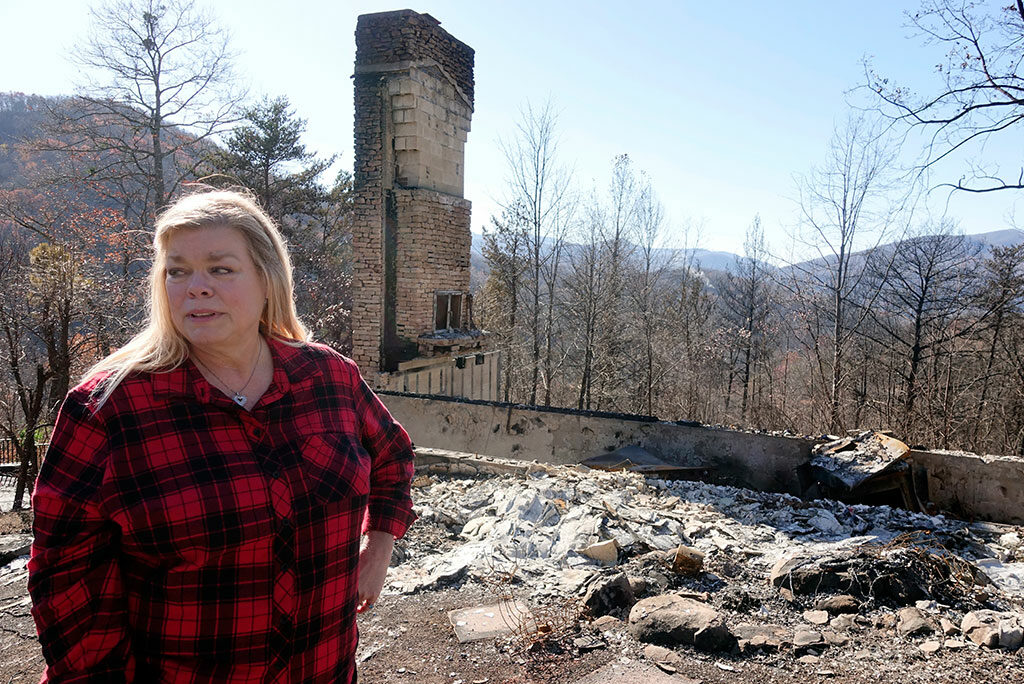
By Kim Plummer Krull
At a Sevier County resource center for people who fled Tennessee’s deadly forest fires, the Rev. Robert Portier spotted at least a half-dozen faces from his congregation.
But instead of picking up emergency supplies, these members of St. Paul Lutheran Church in Sevierville were helping survivors of their state’s worst wildfire in a century.
“People want to help. I’m getting calls and questions from people all over the nation,” Portier said of inquiries that have “been pouring in” since the fires began Nov. 28 in the Great Smoky Mountains National Park.
Fueled by drought and hurricane-force winds, blazes swept through the Gatlinburg area, killing at least 14 people, according to news reports, and damaging or destroying more than 1,400 homes and businesses.
In Sevierville, 10 miles north of Gatlinburg, St. Paul families remained safe although houses were coated in ash and the church “smelled like a chimney for about a week,” Portier said.
But the congregation knows many others in their county — including evacuees who fled with nothing — are suffering. In an area largely dependent on tourism, the inferno that scorched some 18,000 acres claimed jobs along with homes and possessions.
“A large part of this population makes a living cleaning vacation rental cabins and hotel rooms,” said Portier, explaining why St. Paul has a Wednesday night service year round, not just during Advent. “A lot of people are working on Sundays.”
Devotions for lives turned upside down
A relatively small congregation with a major disaster just beyond its church doors, St. Paul wanted to reach out but was unsure how best to proceed.
Portier appreciates that even as he and church elders made calls checking on congregants, LCMS Disaster Response checked in with St. Paul and its community.
Thankfully, the pastor says, he could report that the county immediately opened shelters and distribution centers that were “doing a good job” getting people housing and emergency services.
As they plug into volunteer opportunities, the pastor and his congregation are using resources provided by LCMS Disaster Response to meet spiritual-care needs that go beyond the reach of the local government and the Red Cross.
“The materials are very helpful, helping us learn as we go,” Portier said of LCMS resources that arrived the day after the Disaster Response call, including a basic disaster-response guide for the congregation and spiritual-care booklets to share.
The pastor gave copies of one booklet — “Trusting in His Love: Even when we don’t understand what’s going on around us” — to a St. Paul congregant. She works as a high-school counselor and knows at least 150 students from families who lost homes in the fires.
On his many visits to the shelters and emergency centers, Portier offers a copy of “The Lord’s Mercy Endures Forever: 40 Daily Devotions of God’s Comfort” as well as something else welcomed by people whose lives have turned upside down: a “listening” ear.
He also saw the solace provided by a furry head when he accompanied Jewel, the Lutheran Church Charities K-9 Comfort Dog, and Jewel’s handler from Christ Our Savior Lutheran Church in Loudon, Tenn.
“The dog just sits there, which is great for people who just need an animal to pet or cry on,” Portier said.
Blessing of compassion
By Dec. 6, fewer than 150 people remained in emergency shelters, and more areas of Gatlinburg were opening for the safe return of property and business owners, Portier reported on St. Paul’s website.
But while emergency needs are being covered, the pastor knows families are likely to struggle with long-term housing and unemployment.
“These are our neighbors, and we plan to be there for them for the long haul,” said Portier, who expresses gratitude for “all the prayers and the tremendous outpouring of support from throughout the Synod.”
The Rev. Ross Johnson, director of LCMS Disaster Response, thanks “all the generous people who make it possible for us to get spiritual-care resources to pastors and congregations, free of charge, when their communities need them.
“Sometimes the help Disaster Response provides is through grant dollars, but other times it’s the compassion our congregations show their communities that’s the blessing.”
In response to inquiries about giving opportunities, Portier suggests three options through the Synod:
- LCMS Disaster Response,
- the LCMS Mid-South District, designating “Gatlinburg relief effort,” and
- St. Paul Lutheran Church, designating “Sevier County Relief Fund.”
Kim Plummer Krull (kimkrull@sbcglobal.net) is a freelance writer and member of St. Paul’s Lutheran Church, Des Peres, Mo.
Posted December 14, 2016